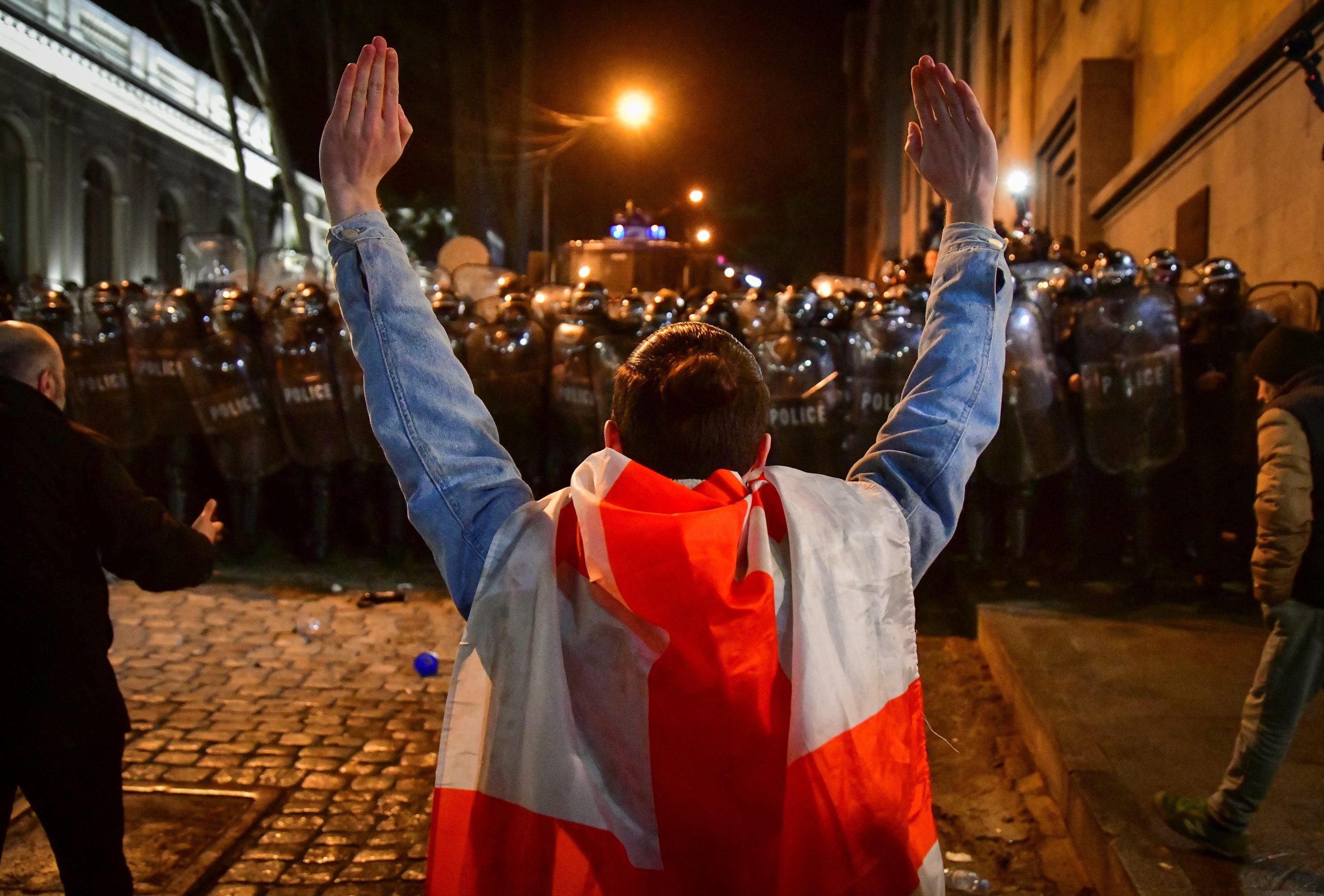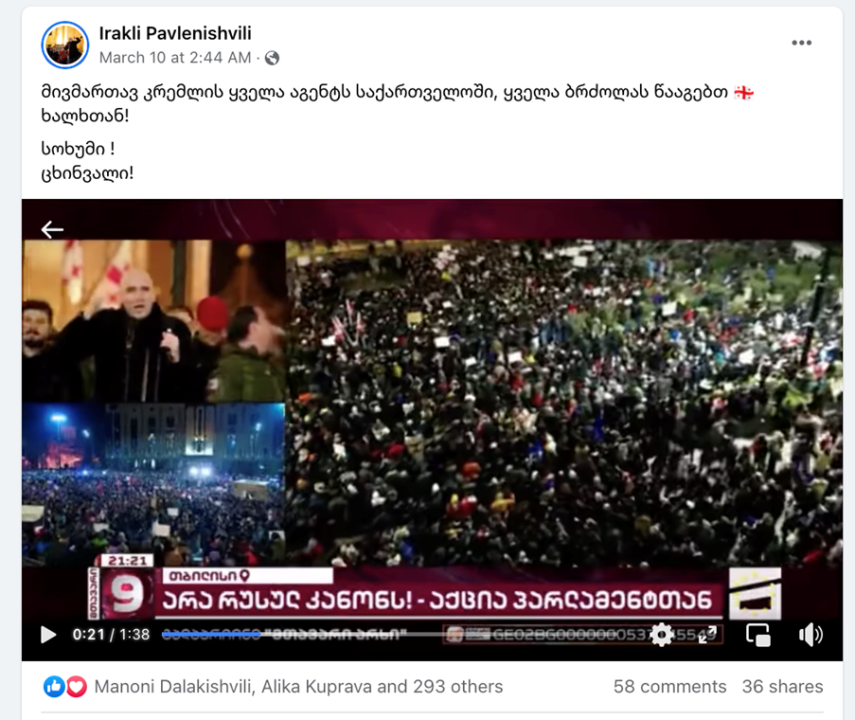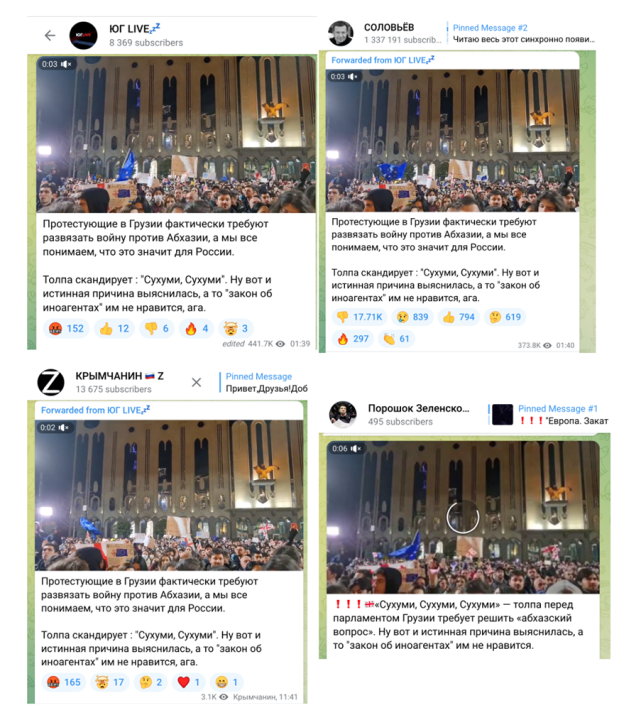How the Kremlin misrepresented a video to claim Georgian protesters seek war with Russia
Footage from a protest in Tbilisi was presented with false context to accuse protesters of seeking war in the Russian-occupied Georgian region of Abkhazia
How the Kremlin misrepresented a video to claim Georgian protesters seek war with Russia
Share this story

A speech delivered by Irakli Pavlenishvili, a member of the opposition United National Movement (UNM) party, sparked a Russian narrative claiming Georgian protesters are warmongers. (Source: Irakli Pavlenishvili/archive)
The Kremlin and its proxies are attempting to claim that protesters in Georgia want to wage war with Russia to reclaim occupied Georgian territories. The narrative paints Georgian protesters, who opposed the now-withdrawn “foreign agents bill,” as ultra-nationalist warmongers. The narrative is the latest attempt at creating an environment of fear by suggesting a war with Russia is brewing. For years, sowing fears over a war with Russia has been the leading strategy of pro-Kremlin information operations in Georgia.
In a Telegram post, Margarita Simonyan, editor-in-chief of the Kremlin-owned news outlet RT, claimed that the protest chant “Sokhumi” (the capital of the Russian-occupied Abkhazia region) was a reference to Georgian protesters wanting to “open a second front” with Russia. She said that if Russia were to repeat the 2008 invasion of Georgia, Moscow would “not send troops there, but will simply shy away [slang for “bomb”] Tbilisi, without particular discernment.”
The narrative was picked up and amplified by the Kremlin-backed leaders of Georgia’s occupied regions of Abkhazia and South Ossetia, Russian media and pundits, and Russian-language Telegram channels.
The international community maintains that Abkhazia and South Ossetia are part of Georgia. Despite this, Russia and a handful of its allies (Syria, Nicaragua, Nauru, and Venezuela) recognized the occupied regions as Russian after the 2008 Georgian war.
Online amplification of “warmongers” narrative
An address during the March 9 demonstration against the “foreign agents” bill prompted the narrative that equates protesters with “warmongers.” Irakli Pavlenishvili, a member of the opposition United National Movement (UNM) party, told the protesters that he was from Eredvi, Tskhinvali, a Russia-occupied region in Georgia. “My land is occupied,” he said. “The St. George Church, where my ancestors prayed, is partially destroyed. My purpose in life is to go back and throw out occupiers. Everyone must return to Gagra, Sokhumi, Tskhinvali, Eredvi.” After his speech, Pevlenishvili started chanting “Sokhumi,” and several protestors joined in the chant.

Kremlin proxies quickly capitalized on the video to promote a false narrative that claimed the real aim of the demonstrations was to open a second front with Russia to regain control over the occupied regions. Simonyan’s Telegram post garnered more than 700,000 views and 10,500 shares. The total reach of the keyword “Сухуми” (Sokhumi in Russian) on Telegram on March 10 exceeded eight million views.

This narrative was further amplified in a post on the Telegram channel ЮГ LIVE (“South Live”), which is the southern bureau of СОЛОВЬЁВ LIVE (“Solovyov Live”), a Telegram channel operated by Kremlin propagandist Vladimir Solovyov. The post contained a fragment of a video from the March 10 demonstration in Tbilisi, showing the crowd chanting “Sokhumi.” The video was disseminated with the caption, “Protesters demand waging war against Russia…The real reason [for the protests] is uncovered.” The post was forwarded to dozens of Telegram channels, including СОЛОВЬЁВ LIVE. It reached more than 600,000 users, according to a TGStat query.

Pro-Kremlin media outlets also picked up the narrative. For example, Tsargrad TV, owned by the sanctioned oligarch Konstantin Malofeev, published an article about the Tbilisi protests titled “Georgian rioters gave themselves away just with one word. The worst fears about the second front are coming true.” Meanwhile, on March 10, the pro-Kremlin online media outlet EurAsia Daily published an interview with Akhra Avidzba, a combatant from Abkhazia who fought against Ukraine in the Donbas. Avidzba repeated the same pro-Kremlin narrative that the real aim of the protests was to open a second front with Russia.
The narrative also coincided with the official statements released by the de-facto leaders of Abkhazia and South Ossetia. A day earlier, on March 9, Abkhazia Foreign Minister Inal Ardzinba said that the primary goal of the United States in the South Caucasus was to open a second front with Russia. The same day, Ardzinba held a phone conversation with Akhsar Dzhioyev, his counterpart in South Ossetia, and agreed on coordinating actions to prevent possible threats from Georgia.
Views of Georgian citizens on occupied regions
There is consensus among Georgian youth on a peaceful solution in Abkhazia and South Ossetia, according to a 2021 survey by the Caucasus Research Resource Centers (CRRC). The results showed that the overwhelming majority (95 percent) of young Georgians support negotiations rather than using force. The majority (66 percent) of young Georgians also said they would participate in reconciliation efforts.
More recent public opinion polls from December 2022 also demonstrate that Georgians feel socio-economic issues are the most important national issues, with territorial integrity listed in fourth place.
In addition, the State Strategy on Occupied Territories rejects any military solution, seeking peaceful means of reintegration and de-occupation “in conjunction with the return of internally displaced persons and refugees.”
Cite this case study:
Sopo Gelava, “How the Kremlin misrepresented a video to claim Georgian protesters seek war with Russia,” Digital Forensic Research Lab (DFRLab), March 14, 2023, https://dfrlab.org/2023/03/14/how-the-kremlin-misrepresented-a-video-to-claim-georgian-protesters-seek-war-with-russia/

